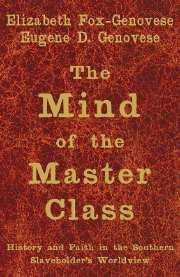Book contents
- Frontmatter
- Contents
- Preface
- List of Abbreviations
- Prologue
- PART ONE CRADLED IN THE STORMS OF REVOLUTION
- PART TWO THE INESCAPABLE PAST
- PART THREE ANCIENT LEGACIES, MEDIEVAL SENSIBILITY, MODERN MEN
- PART FOUR A CHRISTIAN PEOPLE DEFEND THE FAITH
- 13 A Christian People
- 14 Unity and Diversity among the Faithful
- 15 War over the Good Book
- 16 Slavery: Proceeding from the Lord
- 17 The Holy Spirit in the Word of God
- 18 Jerusalem and Athens – Against Paris
- 19 Serpent in the Garden: Liberal Theology in the South
- 20 Theopolitics: Golden Rule, Higher Law, and Slavery
- Coda: St. John of Pottawatamie
- PART FIVE AT THE RUBICON
- Epilogue: King Solomon's Dilemma
- Supplementary References
- Index
19 - Serpent in the Garden: Liberal Theology in the South
Published online by Cambridge University Press: 05 June 2012
- Frontmatter
- Contents
- Preface
- List of Abbreviations
- Prologue
- PART ONE CRADLED IN THE STORMS OF REVOLUTION
- PART TWO THE INESCAPABLE PAST
- PART THREE ANCIENT LEGACIES, MEDIEVAL SENSIBILITY, MODERN MEN
- PART FOUR A CHRISTIAN PEOPLE DEFEND THE FAITH
- 13 A Christian People
- 14 Unity and Diversity among the Faithful
- 15 War over the Good Book
- 16 Slavery: Proceeding from the Lord
- 17 The Holy Spirit in the Word of God
- 18 Jerusalem and Athens – Against Paris
- 19 Serpent in the Garden: Liberal Theology in the South
- 20 Theopolitics: Golden Rule, Higher Law, and Slavery
- Coda: St. John of Pottawatamie
- PART FIVE AT THE RUBICON
- Epilogue: King Solomon's Dilemma
- Supplementary References
- Index
Summary
We have failed to lay the stress of the argument on the right and duty of society to care for all its members, placing all in the positions for which God fitted them, partly because our minds have to some degree been infected by the virus of Red Republican theory which has made the social system at the North rotten to the core.
—W. A. CaveThe southern churches, for all their vaunted orthodoxy, could not wholly resist the rising tide of theological liberalism, as capitalism inexorably transformed the world into one grand marketplace of ideas as well as commodities. No society could insulate itself from marketplace sentiments and ideas, which themselves metamorphosed into commodities. Supposedly, heresies, cults, and isms flourished only in the free states, but they were making troublesome inroads into the slave states. Vigilance emerged as the South's order of the day.
Long-standing theological and ecclesiastical differences within the national Presbyterian Church flared into acrimony in the 1830s, and the split in 1837 between the orthodox Calvinist Old School and the more variegated New School exposed the strength but also the greater weakness of theological liberalism in the South. Beneath ecclesiastical and political issues lay theological ones: faithfulness to the Orthodox Westminster Confession and to the formulaic five points of Calvinism or “TULIP” (total depravity, unconditional election, limited atonement, irresistible grace, and perseverance of the saints). The New School arose in the Northeast primarily among men who professed to defend Calvinism against the Unitarians but who made more and more concessions to advocates of free will (Arminians). They repudiated predestination or interpreted it so flexibly as to make Arminians gloat over their surrender.
- Type
- Chapter
- Information
- The Mind of the Master ClassHistory and Faith in the Southern Slaveholders' Worldview, pp. 587 - 612Publisher: Cambridge University PressPrint publication year: 2005



